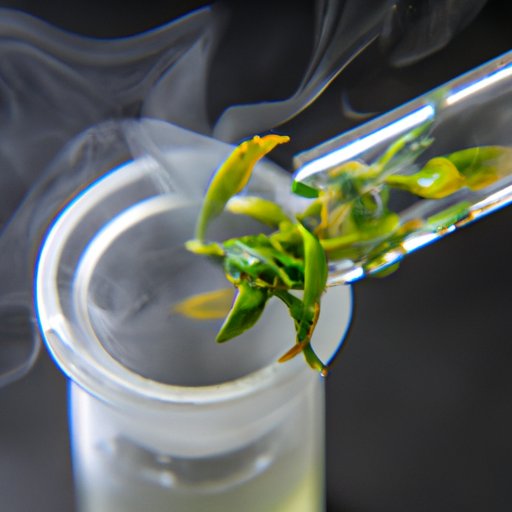
Introduction
Dry cough is a common respiratory problem that many people experience at some point in their lives. It is often caused by allergies, colds, flu, infections, or even acid reflux, among others. While it’s not generally a serious condition, it can be annoying and disruptive, especially at night when it affects your sleep. In this article, we’ll explore some of the best natural and over-the-counter remedies that may help alleviate your dry cough, as well as when to seek medical attention.
Home Remedies
Many natural remedies may help soothe dry cough symptoms. Some popular ones include:
- Honey: Honey has both antiviral and antibacterial properties and can help reduce inflammation in the throat. Mix a tablespoon with warm water or tea.
- Ginger: Ginger has been used for centuries as a remedy for cough and colds. You can chew raw ginger or make a tea by boiling sliced ginger and mixing it with honey and lemon.
- Turmeric: Turmeric contains curcumin, a compound that may help improve lung function and reduce inflammation. Mix a teaspoon of turmeric in warm water or milk to make a tea.
- Herbal teas: Herbal teas such as chamomile, peppermint, and thyme have natural anti-inflammatory properties and can help loosen mucus and soothe cough symptoms.
Over-the-Counter Medications
If natural remedies fail to relieve your dry cough, you may want to try over-the-counter cough medicines. There are two types of medicines: those that suppress the cough and those that thin the mucus. Some common active ingredients in cough medicines include:
- Dextromethorphan: a cough suppressant that blocks the cough reflex.
- Guaifenesin: an expectorant that helps thin mucus and makes it easier to cough.
It’s important to read the labels and follow instructions carefully when using cough medicines. Always choose a medicine based on your symptoms and age, and never give over-the-counter cough medicines to children under four years old without consulting a healthcare provider.
Hydration
Staying hydrated is crucial when you have a dry cough, as it helps keep the mucous membranes moist and loosen the mucus. Here are some fluids and foods that can help boost hydration:
- Water: drink plenty of water throughout the day to keep your body hydrated.
- Herbal teas: as mentioned earlier, herbal teas such as chamomile, peppermint, and thyme can also help keep you hydrated.
- Bone broth: bone broth is rich in nutrients and can soothe an irritated throat.
- Fruits: fruits like watermelon, pineapple, and oranges are high in water content and can help hydrate your body.
Steam Inhalation
Steam inhalation is another effective remedy for alleviating dry cough symptoms. It works by loosening mucus and clearing the airways. Here are some ways to try steam inhalation:
- Humidifiers: using a humidifier in your home can help add moisture to the air and prevent your throat from drying out.
- Hot shower: taking a hot shower can also help provide steam for inhalation. Simply close the bathroom door and breathe steam in deeply.
- Steam bowl: boil water and transfer it into a bowl. Drape a towel over your head and lean over the bowl, breathing deeply for about 10 minutes.
Essential Oils
Aromatherapy using essential oils can also help alleviate dry cough symptoms. Some essential oils that may help relieve coughs include:
- Eucalyptus: eucalyptus oil can help soothe the airways and promote decongestion.
- Peppermint: peppermint oil can help calm a cough and relieve throat irritation.
- Tea tree oil: tea tree oil has natural antibacterial and antiviral properties and can help fight respiratory infections.
To use essential oils, you can add a few drops to a diffuser or vaporizer or add them to boiling water for inhalation. However, be sure to use essential oils safely and always dilute them with a carrier oil before applying topically.
Acupuncture and Acupressure
Acupuncture and acupressure are ancient Chinese healing techniques that may help alleviate dry cough symptoms. They work by stimulating specific points on the body that correspond to the lungs, throat, and respiratory system. Some common pressure points for cough relief include:
- CV22: located in the hollow at the base of the throat
- LU5: located in the upper arm, about 1.5 inches below the elbow crease
- BL13: located in the back, about 1.5 inches away from the spine on either side of the upper back
Acupuncture and acupressure should be performed by a licensed practitioner who has knowledge and experience with respiratory problems.
When to Seek Medical Attention
While dry cough is generally not a serious condition, there are certain signs and symptoms that require medical attention. These include:
- Cough lasting more than two weeks without improvement
- Chest pain or tightness
- Shortness of breath
- High fever
- Coughing up blood
If you experience any of these symptoms or are concerned about your cough, it’s essential to seek medical help right away.
Conclusion
Dry cough can be a frustrating and disruptive condition, but there are many natural remedies and over-the-counter medicines that may help alleviate symptoms. Keep your body hydrated, try natural remedies like honey and ginger, consider steam inhalation or aromatherapy, and don’t hesitate to seek medical attention if you have any concerning symptoms.




